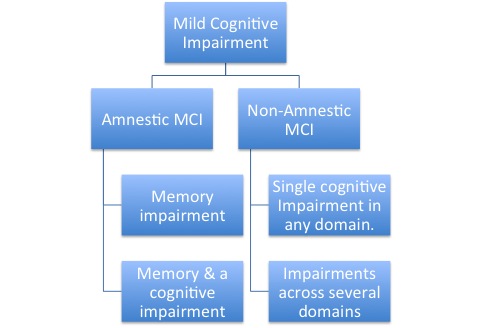Dementia is a severe long-term condition of the brain in which memory and thinking is affected. Mild cognitive impairment is mild loss of memory and some minor problems with thinking.

What is Dementia?
Definition:
Dementia is a long-term medical problem involving issues with the brain and such aspects as memory, judgment, and thinking, which becomes worse in the future.
Symptoms:
Symptoms of dementia always include memory loss, with forgetfulness becoming much worse over time. People may also become psychotic and lose touch with reality. There may be delusions, paranoia, and, in some cases, even hallucinations. Personality may change and people may act in bizarre ways.
Diagnosis:
A mental status evaluation needs to be done to determine the level of impairment. A person with dementia will also have their memory tested. Depending on the cause of dementia, imaging tests may be useful.
Causes:
There are multiple causes for dementia, ranging from traumatic injury to infection or genetic mutations. Infections from bacteria like that which causes syphilis can cause mental problems. The prions like that which causes Creutzfeldt-Jakob disease always result in dementia. Genes implicated in Huntington’s and Parkinson’s disease both can result in the development of dementia. Problems with blood vessels in the brain can also produce dementia.
Risk factors and complications:
Being an older adult is a risk factor as is having certain genes such as those for Huntington’s disease or the gene associated with the abnormal protein of Alzheimer’s disease. Traumatic brain injury is another risk factor for developing dementia. The complication is usually death, as the illness is progressive.
Prevention and treatment:
Prevention is often not possible in the case of dementia caused by genetic or unknown factors. Reducing a person’s risk of contracting syphilis or prion disease may be helpful though in stopping infections that can lead to the condition. Prescription drugs can be helpful in controlling symptoms such as memory loss, but dementia cannot be cured and is usually progressive.

What is Mild Cognitive Impairment?
Definition:
Mild cognitive impairment (MCI) is a condition in which memory and thinking is adversely affected but not to the severe extent that it is in dementia.
Symptoms:
Frequent forgetfulness, forgetting while you are talking, compromised judgment and getting lost in areas that one used to know well are some signs of MCI. The symptoms are much less severe than in dementia and the person is often aware that they are having some problems.
Diagnosis:
Doctors do not have a specific test for MCI, but they do use a list of criteria to evaluate patients. The criteria include looking at memory, mental status, functioning in everyday life, and whether or not the patient has declined. The physician also has to eliminate the diagnosis of dementia, although MCI can lead to dementia.
Causes:
There are many reasons why someone may show mild cognitive impairment including the start of Alzheimer’s disease or Lewy body dementia. Small strokes can also lead to some impairment due to compromised blood flow to particular parts of the brain.
Risk factors and complications:
A risk factor is old age which is when many conditions such as dementia become evident. The presence of a form of the APOE gene that is associated with Alzheimer’s disease is also a risk factor for cognitive impairment. Lifestyle factors such as smoking, lack of exercise, obesity as well as having high cholesterol or blood pressure also put one at risk of cognitive problems in later life. The complication is if the mild cognitive impairment worsens and develops into dementia which is much worse, and in fact, up to 15% of adults with such impairment do develop dementia.
Prevention and treatment:
There are no proven treatments that stop MCI but some physicians use cholinesterase inhibitors if memory loss is evident.
Difference between Dementia and Mild cognitive impairment?
Definition
Dementia is a severe, progressive and long-term brain condition in which memory and thought is badly affected. Mild cognitive impairment is defined as having minor problems with thinking and memory.
Memory and thinking
Dementia includes worsening forgetfulness and problems with thought. Mild cognitive impairment is only minor memory loss and thought problems.
Personality and behavior
People with dementia often show changes in personality and bizarre behavior patterns. People with mild cognitive impairment do not show changes in their personality or behavior.
General causes
Dementia can be caused by many factors including trauma to the brain, vascular problems, infections, and some genetic diseases. Mild cognitive impairment can be a result of becoming older or it can be an early sign of dementia.
Prion disease
Prion diseases always lead to dementia and death. Prion diseases do not cause mild cognitive impairment.
Table comparing Dementia and Mild cognitive impairment

Summary of Dementia Vs. Mild cognitive impairment
- Dementia is a severe condition that continues until death.
- Mild cognitive impairment is a very mild form of forgetfulness and trouble with thinking.
- Dementia has many causes including genetic mutations, infections such as prion disease and brain trauma or blood vessel problems in the brain.
- Dementia and MCI both impact memory and judgment but dementia is the more severe condition that becomes worse over time.
- Some similar medications may be used to treat both mild cognitive impairment and dementia to help patients who are experiencing some forgetfulness.
- Not all patients with MCI develop dementia, but some do.
- Difference Between Rumination and Regurgitation - June 13, 2024
- Difference Between Pyelectasis and Hydronephrosis - June 4, 2024
- Difference Between Cellulitis and Erysipelas - June 1, 2024

